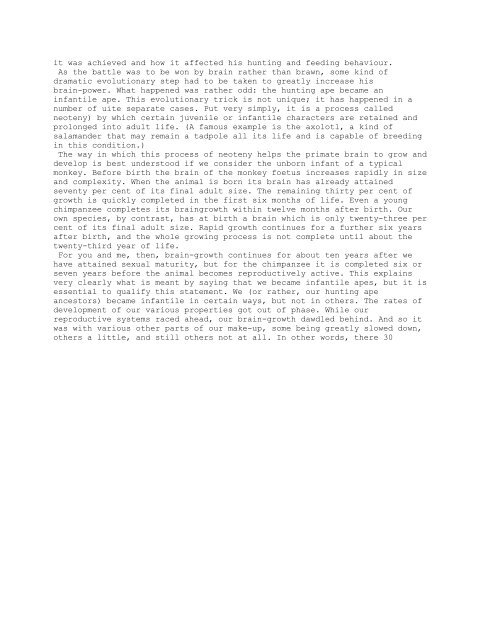Create successful ePaper yourself
Turn your PDF publications into a flip-book with our unique Google optimized e-Paper software.
it was achieved and how it affected his hunting and feeding behaviour.<br />
As the battle was to be won by brain rather than brawn, some kind of<br />
dramatic evolutionary step had to be taken to greatly increase his<br />
brain-power. What happened was rather odd: the hunting ape became an<br />
infantile ape. This evolutionary trick is not unique; it has happened in a<br />
number of uite separate cases. Put very simply, it is a process called<br />
neoteny) by which certain juvenile or infantile characters are retained and<br />
prolonged into adult life. (A famous example is the axolotl, a kind of<br />
salamander that may remain a tadpole all its life and is capable of breeding<br />
in this condition.)<br />
The way in which this process of neoteny helps the primate brain to grow and<br />
develop is best understood if we consider the unborn infant of a typical<br />
monkey. Before birth the brain of the monkey foetus increases rapidly in size<br />
and complexity. When the animal is born its brain has already attained<br />
seventy per cent of its final adult size. The remaining thirty per cent of<br />
growth is quickly completed in the first six months of life. Even a young<br />
chimpanzee completes its braingrowth within twelve months after birth. Our<br />
own species, by contrast, has at birth a brain which is only twenty-three per<br />
cent of its final adult size. Rapid growth continues for a further six years<br />
after birth, and the whole growing process is not complete until about the<br />
twenty-third year of life.<br />
For you and me, then, brain-growth continues for about ten years after we<br />
have attained sexual maturity, but for the chimpanzee it is completed six or<br />
seven years before the animal becomes reproductively active. This explains<br />
very clearly what is meant by saying that we became infantile apes, but it is<br />
essential to qualify this statement. We (or rather, our hunting ape<br />
ancestors) became infantile in certain ways, but not in others. The rates of<br />
development of our various properties got out of phase. While our<br />
reproductive systems raced ahead, our brain-growth dawdled behind. And so it<br />
was with various other parts of our make-up, some being greatly slowed down,<br />
others a little, and still others not at all. In other words, there 30








